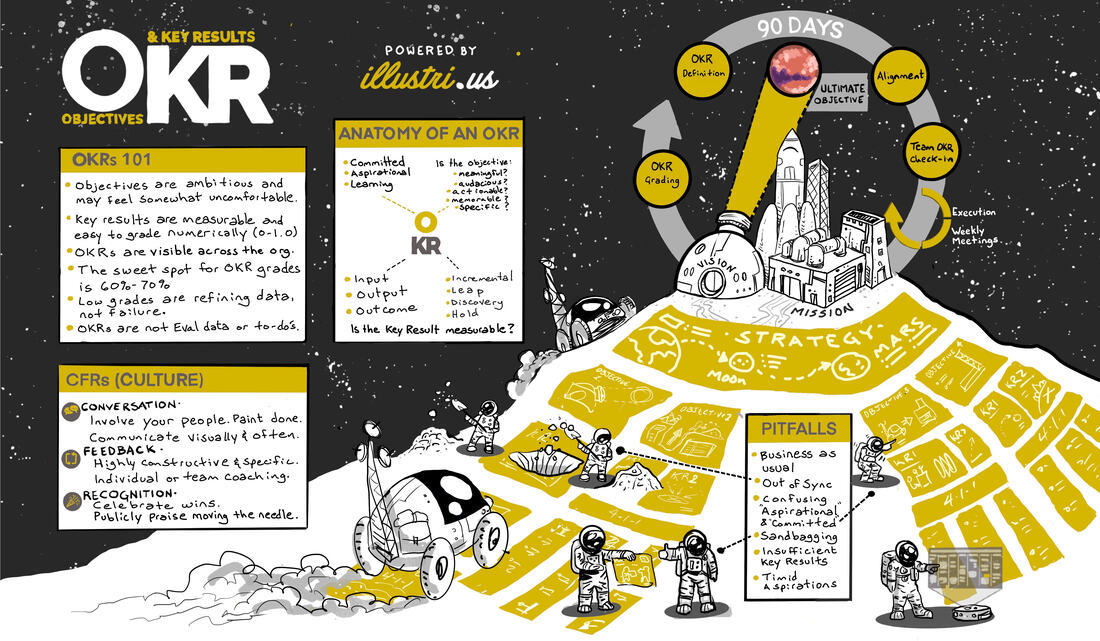|
Do you sometimes feel like the people in your business are speaking different languages or reading from different playbooks? Do you fear that, if asked, your team wouldn’t be able to tell you what your top priorities for this year (or this quarter) are? You are not alone. 64% of leaders believe their team can tell them the top priorities from memory. Unfortunately, only 2% can do it. Why the disparity? Your business goals need to be kept simple. They need to be reduced to the fewest possible metrics, the fewest goals, the fewest steps, the fewest moving parts. THEIR HISTORY Objectives and Key Results (OKRs) is a goal-setting framework used by individuals, teams, and organizations to define measurable goals and track their outcomes. It all began in 1954 when Peter Drucker published his book The Practice of Management, which introduced the concept of “Management by Objectives.” In 1975, John Doerr, at the time a salesperson working for Intel, attended a course taught by Andrew Grove where he was introduced to the theory of OKRs, then called "iMBOs" ("Intel Management by Objectives"). The development of OKRs is generally attributed to Grove who introduced this approach at Intel. Grove later documented OKRs in his 1983 book High Output Management. Then, as fate would have it, in 1999, Doerr introduced the idea of OKRs to Google. The idea took hold and OKRs quickly became central to Google's culture as a "management methodology that helps to ensure that the company focuses efforts on the same important issues throughout the organization." Doerr published Measure What Matters, his definitive book about the OKRs framework, in 2017. Christina Wodtke, who worked at Zynga with John Doerr, published her shorter (and arguably superior) book, Radical Focus in 2016. WHAT OKRs ARE (AND AREN’T) OKRs are not a strategic planning, project planning, or performance evaluation framework. They are an alignment framework and are intended to get your team facing in the right direction and reading from the same page over the next 90 days. Imagine a construction company - let’s call them ABC, the Amazing Building Company - with no foreman, no plan, no deadline, and no meetings. The workers may feel pulled in many different directions, working on many things at once, and never have a sense of what anyone else is doing. You may actually feel like that now in your business. If half of the workers at ABC are digging holes over the next few months, and the other half are filling them, the company makes no progress on their plans to break ground. However, if they decide that there is plenty of time to move earth later and that for the next 90 days they need all hands on deck to dig, dig, dig, then they will make significant progress on the plan. The workers will expend the same amount of energy, but now instead of feeling like they are in a swirl of inefficiency, they will feel oriented toward a common goal and be working toward something together. OKRs are an ideal solution for businesses needing to achieve a specific goal or finish a certain project, prove or disprove a hypothesis, or get everyone on the team leaning into a specific process or change (a.k.a. “steering the elephant”) over the next 90 days. An aligned team is an efficient team. And an efficient team is a powerful team. WHY USE OKRs? In practice, using OKRs is different from other goal-setting techniques (KPIs, SMART Goals, OGSM, Balanced Scorecards) because of the aim to set very ambitious goals. When used this way, OKRs can enable teams to focus on the big bets and accomplish more than the team thought was possible, even if they don’t fully attain the stated goal. OKRs can help teams and individuals get outside of their comfort zones, prioritize work, and learn from both success and failure. Plenty of leaders do not put in the time to do their OKRs well. They are busy hiring, dealing with emergencies and top priorities, or chunking their time in an attempt to leverage and maximize their activity to output ratio. The best leadership doesn’t break when it comes to setting strategy and key initiatives. They put in the time to discuss important ideas with their top executives because they know that an extra day spent planning will reap rewards down the line if executed properly. Taking the time to plan OKRs and adequately assess them after each time period is a sign of respect for your colleagues and employees. It means you respect the placement of their time and efforts. OKRs are only as effective as your commitment to using them and your efforts in creating them. If you need help implementing OKRs in your business, let’s set up a call to see if we can help.
You can also download our free e-book, OKRs 1.0: A Beginners Guide to Measuring What Matters in Your Organization, to learn more about the anatomy of OKRs and when to use them.
0 Comments
Your comment will be posted after it is approved.
Leave a Reply. |
Details
ABOUT THE AuthorJoran Slane Oppelt is an international speaker, author and consultant with certifications in coaching, storytelling, design thinking and virtual facilitation. Archives
March 2024
Categories
All
|


 RSS Feed
RSS Feed